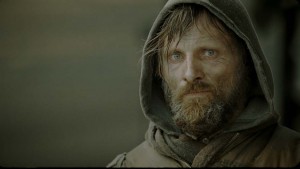THE ROAD: 2 STARS
 Imagine a world where “each day is greyer than the day before” and cannibalism is a person’s worst fear. Nope, it’s not the latest George A. Romero film—there isn’t a zombie in sight—it’s “The Road,” the new film from the writer Cormac McCarthy. It’s so bleak, so unrelentingly dour it makes the last film adapted from his work, the Coen Brothers’s “No Country for Old Men,” seem positively lighthearted by comparison.
Imagine a world where “each day is greyer than the day before” and cannibalism is a person’s worst fear. Nope, it’s not the latest George A. Romero film—there isn’t a zombie in sight—it’s “The Road,” the new film from the writer Cormac McCarthy. It’s so bleak, so unrelentingly dour it makes the last film adapted from his work, the Coen Brothers’s “No Country for Old Men,” seem positively lighthearted by comparison.
The story is simple. A man and his son (Viggo Mortenson and Kodi Smit-McPhee) are trying to survive in a dystopian world. Everything they knew is gone. In flashbacks we see a wife (Charlize Theron) who cracked under the pressure to survive; killing herself after setting father and son on their journey to “the coast” in an attempt to escape the harsh post apocalyptic weather. Armed with only a gun and two bullets they must scavenge for food amid the ruins and protect themselves from cannibals who roam the desolate land. There’s no Hope (or Crosby) on this road. Their raison d’etre is to maintain their humanity and survive in a world no longer able to support life.
“The Road” doesn’t mimic the dystopian world we’ve seen in bigger budget action movies. For better and for worse this is a movie based on small moments set against a big backdrop. No parent will be able to forget the stark image of a father teaching his son how to commit suicide or seeing a young boy who doesn’t know what a can of Coke is. Equally memorable is the Man visiting his now dilapidated childhood home. There, the simple act of turning over a filthy seat cushion to reveal the clean flipside is a reminder of a life that is gone forever. These are effective moments; the kind of filmmaking that will never occur to Michael Bay.
But having said that, “The Road” could use a little Michael Bay. Bleak is one thing. I can do bleak, but I’d like a bit more entertainment value thrown in. In the 112 minute running time there is too much down time when nothing happens, or when opportunities are blown.
Take the Coke can sequence. The man offers his son a Coke he has found in an abandoned vending machine. For all he knows it could be the last can of soda in the world; a simple pleasure that means much in a world where simply staying alive is a luxury. The boy takes a sip, enjoys the foreign sensation of the bubbles against his tongue before insisting his dad have some. The Man takes a swig. We see a smile begin to form, a sign of the reverie of a familiar sensation in a harsh world. At least I think that’s what it is, but I’ll never know for sure because just as Mortenson begins to turn the scene into something special with the transformative look on his face the camera cuts away to the blank faced boy. In a movie where small things mean a lot, the look on Viggo’s visage could have been a showstopper, but instead is a non-moment.
“The Road” despite offering an unexpectedly touching final sequence is probably too bleak to appeal to a mainstream audience. It’s the feel bad movie of the year.
